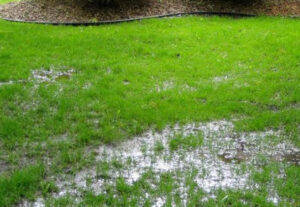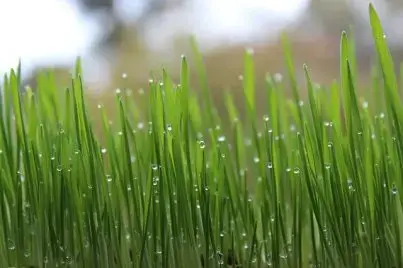Georgia’s weather can be unpredictable, and this year has been no exception. With heavier-than-usual rainfall saturating the ground, many homeowners are facing unique challenges when it comes to maintaining a healthy and beautiful lawn. At Stone Creek Landscaping, we know how frustrating it can be to manage a yard in these conditions, but with the right techniques and proper care, you can still keep your lawn thriving despite the wet weather.
In this blog post, we’ll explore the impact of excessive rain on your lawn and offer actionable tips to help you manage your turf and landscaping during this heavy rain season in Georgia.
Understanding the Impact of Heavy Rain on Lawns
Excessive rain can pose several problems for your lawn, particularly in areas like Marietta, GA, where summer storms and unpredictable downpours are common. Here’s what heavy rainfall can do to your grass and soil:
- Soil Compaction: One of the main issues with too much rain is soil compaction. When the ground remains saturated for too long, it becomes compacted, restricting the grass roots’ access to oxygen. This can lead to poor grass growth and even root rot if the conditions persist.
- Increased Risk of Fungal Diseases: Wet conditions create an ideal environment for fungal growth. Lawns affected by excessive rain are more susceptible to diseases such as brown patch, powdery mildew, and rust fungus.
- Weed Growth: Wet soil and standing water can create ideal conditions for weeds to thrive. Weeds like crabgrass and other invasive species can quickly take over a waterlogged lawn if not controlled properly.
- Nutrient Leaching: Heavy rain can wash away important nutrients from the soil, depriving your grass of essential nutrients needed for healthy growth. This can result in yellowing, thinning, and patchy lawns.
Understanding these potential problems is the first step in taking action to protect your lawn. Now, let’s dive into some practical solutions to help you manage your yard during this heavy rain season.
1. Improve Drainage in Your Yard
One of the best ways to protect your lawn during a rainy season is to ensure proper drainage. Poor drainage can cause water to pool on your lawn, which can drown grass roots and create patches of dead turf. Here are a few tips to improve drainage:
- Aerate Your Lawn: Aerating your lawn helps reduce compaction and allows water to drain more efficiently. By creating small holes in the soil, you allow air, water, and nutrients to penetrate the grass roots. This also helps avoid standing water and promotes a healthier lawn.
- Install French Drains: If your yard has areas that consistently collect standing water, installing a French drain or other drainage systems can help. These drains redirect water away from low-lying areas, preventing puddles and protecting your grass from excess moisture.
- Use Rain Gardens: For yards prone to flooding, consider installing a rain garden. These specially designed areas absorb runoff water, reducing the strain on your lawn and preventing erosion.
2. Adjust Your Mowing Routine
During rainy seasons, it’s important to adjust your mowing habits to prevent damage to your lawn. Wet grass is more susceptible to injury and disease, so following these tips can help:
- Wait Until the Grass is Dry: Mowing wet grass can tear the blades and leave your lawn more vulnerable to fungal infections. Always wait until the grass is dry before mowing to avoid this damage.
- Raise the Mower Blades: When you do mow, set your mower to a higher setting. Taller grass can tolerate wet conditions better and helps promote deeper root growth, making your lawn more resilient to heavy rain.
- Mow Less Frequently: During a rainy season, grass tends to grow quickly. However, it’s best to mow less frequently to avoid unnecessary stress on the lawn. Letting the grass grow a little taller can help the root system stay strong and absorb more water, especially during prolonged wet periods.
3. Prevent Lawn Diseases After Heavy Rain
Fungal diseases thrive in wet conditions, so it’s crucial to take steps to prevent lawn diseases during a heavy rain season. Here’s how you can minimize the risk:
- Fertilize with Care: Too much nitrogen can promote excessive top growth, which is more susceptible to fungal diseases. Use a slow-release fertilizer and avoid over-fertilizing your lawn. This will help balance your grass’s growth and reduce disease risks.
- Promote Air Circulation: Good airflow is essential for preventing diseases in wet conditions. Prune overhanging branches, trim hedges, and remove debris from your lawn to improve air circulation. This allows your lawn to dry out faster after heavy rains.
- Apply Fungicide Treatments: If you notice signs of fungal disease, consider applying a fungicide treatment to affected areas. Spot-treating problem areas early can prevent further spread and help your lawn recover more quickly.
4. Combat Weed Growth
Weeds thrive in wet, disturbed soil, and heavy rain provides the perfect opportunity for them to take over your lawn. To keep weeds at bay:
- Mulch Plant Beds: Apply a layer of mulch around trees, flower beds, and shrubs to prevent weeds from sprouting. Mulch helps retain moisture and reduces weed growth.
- Hand-Pull Weeds: Be diligent about removing weeds as soon as they appear. Hand-pulling them when the soil is moist ensures that you remove the roots, preventing them from growing back.
- Apply Pre-Emergent Weed Control: Consider applying a pre-emergent herbicide to prevent weed seeds from germinating. This is especially effective in combating crabgrass and other warm-season weeds that thrive in Georgia’s wet summers.
5. Rethink Your Watering Schedule When Rain is Heavy
With heavy rains saturating your lawn, you won’t need to water as frequently. Turn off your irrigation system and let nature take care of your lawn’s water needs. Overwatering can exacerbate compaction and contribute to the spread of diseases.
While a heavy rain season poses challenges for lawn care, proactive steps can help maintain a healthy yard. By improving drainage, adjusting your mowing routine, preventing diseases, controlling weeds, and managing water properly, your lawn will not only survive but thrive during this time.
If you’re unsure of how to best care for your lawn this season, don’t hesitate to reach out to Stone Creek Landscaping. Our team of experts is ready to help you keep your yard in tip-top shape, no matter the weather!

